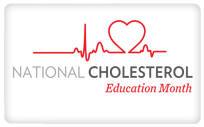September is National Cholesterol Education Month. There is a lot of confusion surrounding cholesterol.
High cholesterol is a topic that gets a lot of press, whether it be about ways to lower it, the negative effects of many cholesterol lowering medications (like statins) or the dire need to optimize cholesterol and other blood fats to prevent disease. Luckily, cholesterol and other blood fats often respond very well to dietary and lifestyle interventions.
To find out more about cholesterol and what you can do about it, check out the links below:
http://www.naturalpathhealthcenter.com/2012/07/12/controlling-cholesterol/
http://www.naturalpathhealthcenter.com/2010/11/30/11-cholesterol-fighting-foods/
http://www.naturalpathhealthcenter.com/2014/02/11/advanced-testing-for-cardiovascular-disease-risk/



For the level of press that cholesterol does get, I still think that it’s too easy for people to ignore. Perhaps this is because it does not produce any noticeable physical symptoms on it’s own, or maybe it’s human nature to avoid an issue that would take this much effort to correct. Still, I do hope that many people take the time to consider their cholesterol levels and heart health this fall. Thank you for sharing the links!
Thanks for taking the time to comment Stephen!
I think a large part of the problem is that many people think that they are significantly reducing their risk of cardiovascular disease by taking statin medications to ‘get their numbers in check’ (meaning their standard fasting lipid panel), when the research simple doesn’t back this up.
Education is part of the issue, as is the point that you make – cholesterol doesn’t ‘hurt’ at least not until a person suffers a heart attack or stroke, at which time (assuming that the person lives) they are given medications that do little to address the underlying issues that created the condition.
We (along with many others) have been teaching progressively minded doctors and health care professionals across the country on how to effectively deal with these underlying issues, so hopefully change is coming!
The good news is that we have control over almost all of the underlying issues that cause or exacerbated cardiovascular disease; we just have to teach people what they have to do and how we can measure progress.
Sincerely,
Dr. Chad